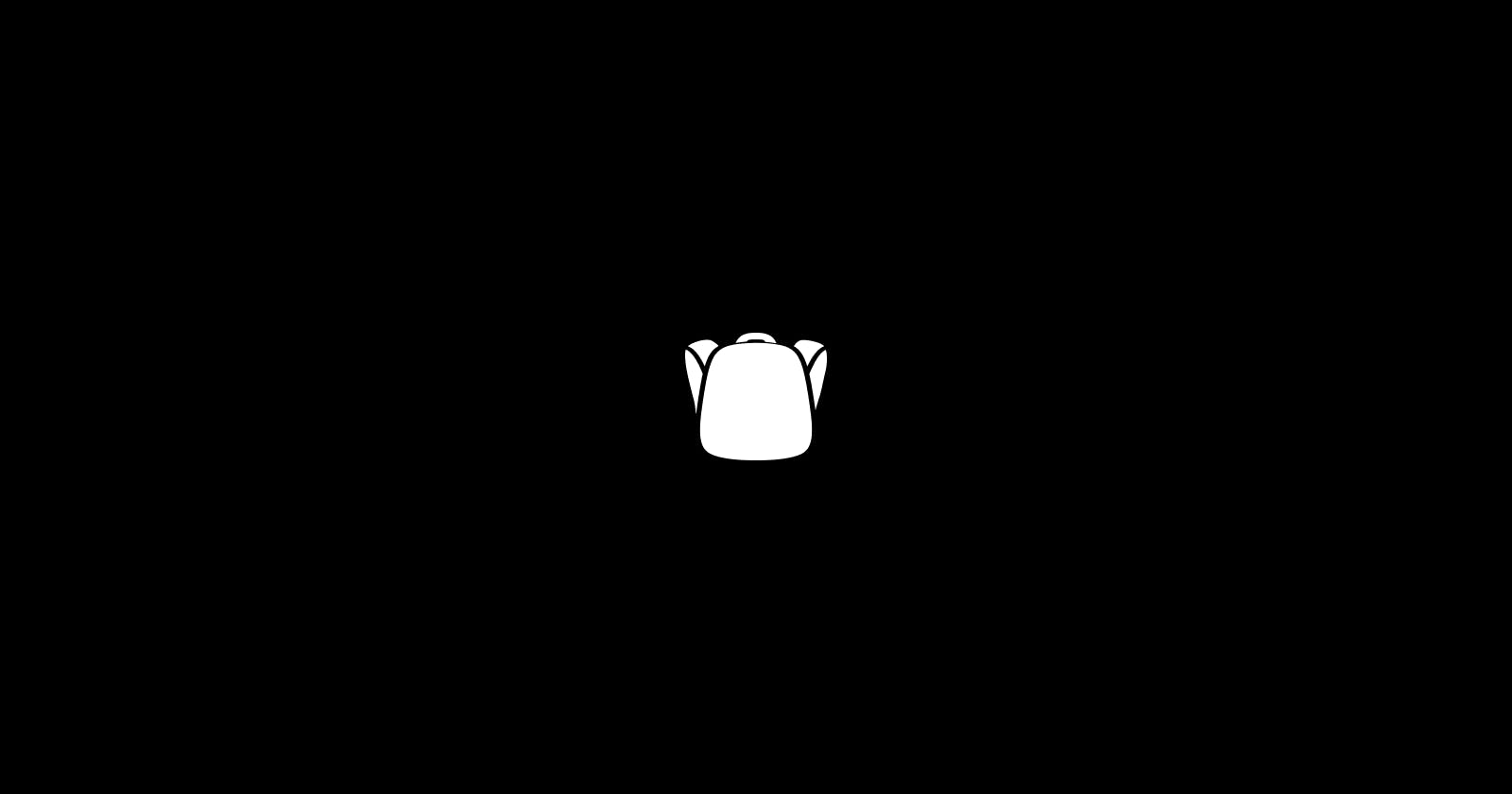Why this is the Time to Build Showwcase
Unbundling LinkedIn for Coders, everywhere
Software is Eating the World
Marc Andreessen, who today runs the prestigious venture capital firm Andreessen Horowitz, is firstly a living legend for having created Mosaic, the first web browser that supported graphics; but his perspective on the future of our world, as shared by his now famous and incredibly prescient 2011 essay "Why Software is Eating the World." is really at the heart of why we are building Showwcase.
He writes:
My own theory is that we are in the middle of a dramatic and broad technological and economic shift in which software companies are poised to take over large swathes of the economy. More and more major businesses and industries are being run on software and delivered as online services — from movies to agriculture to national defense. Many of the winners are Silicon Valley-style entrepreneurial technology companies that are invading and overturning established industry structures. Over the next 10 years, I expect many more industries to be disrupted by software, with new world-beating Silicon Valley companies doing the disruption in more cases than not. Why is this happening now? Six decades into the computer revolution, four decades since the invention of the microprocessor, and two decades into the rise of the modern Internet, all of the technology required to transform industries through software finally works and can be widely delivered at global scale. Over two billion people now use the broadband Internet, up from perhaps 50 million a decade ago, when I was at Netscape, the company I co-founded. In the next 10 years, I expect at least five billion people worldwide to own smartphones, giving every individual with such a phone instant access to the full power of the Internet, every moment of every day. On the back end, software programming tools and Internet-based services make it easy to launch new global software-powered start-ups in many industries—without the need to invest in new infrastructure and train new employees.
This article was, in many ways, one of the main reasons I went to San Francisco in 2017 to learn how to code, learn more about startups, and innovation coming out of Silicon Valley. Fast forward to today, and so much of what was written then is now true. In fact, we're in the midst of an accelerated transition towards this software-driven world thanks to the global coronavirus pandemic.
Whereas digital transformation was merely an initiative for many companies pre-COVID, it has now become a requirement for every business, idea, and company. Every company has to rapidly adjust, to build better, faster, more efficient, more creative products and services in the face of the pandemic. And we've only just begun.
Now, if we believe that "software companies are poised to take over large swathes of the economy", then people that can code - developers, engineers, makers, hackers, data scientists, etc - are the de facto people that can make the most impact in a software-driven world. As a thought exercise, which part of your daily routine does not come in contact with some form of software? The resulting outcome is that the demand for developers is now at its highest ever, which is being met by an explosion of people up-skilling themselves, learning how to code, and moving into the tech industry (I am one of them). In fact, Microsoft estimates the global digital job capacity to be at 200 million by 2025.
Despite this taking shape before our eyes, however, for developers, (1) who we are, (2) how we interact with the community, and (3) find new opportunities is completely fragmented, nothing is built for our specific workflows (the developer workflow), needs, it's low NPS, and design is inconsistent. My experience for (1) is a sub-optimal lonely bad SEO badly-designed personal portfolio (or my resume), for (2) it's an endless search of Slack Spaces, Discord Groups, Reddit Communities or people on Twitter that compete to make the most viral 280 characters on Twitter, and (3) relying on horizontal professional networks to "connect" and find a new job.
Built for People who Code
The internet makes it possible to build for increasingly narrow niches, and it drives customers to expect solutions that are increasingly tailored to their needs and aspirations. These solutions are developed and delivered by people with the specific skills and traits that matter to that niche. - Dror Poleg
Hashnode is a perfect example of this. Catering solely for developers to easily right a blog and they've done an incredible job. I believe we can do the same for a Professional Network like LinkedIn.
At Showwcase, we've made problem (1) (2) and (3) above our core focus. Another way to say this is that we are focused on: Representation. Community. Opportunity.
Representation
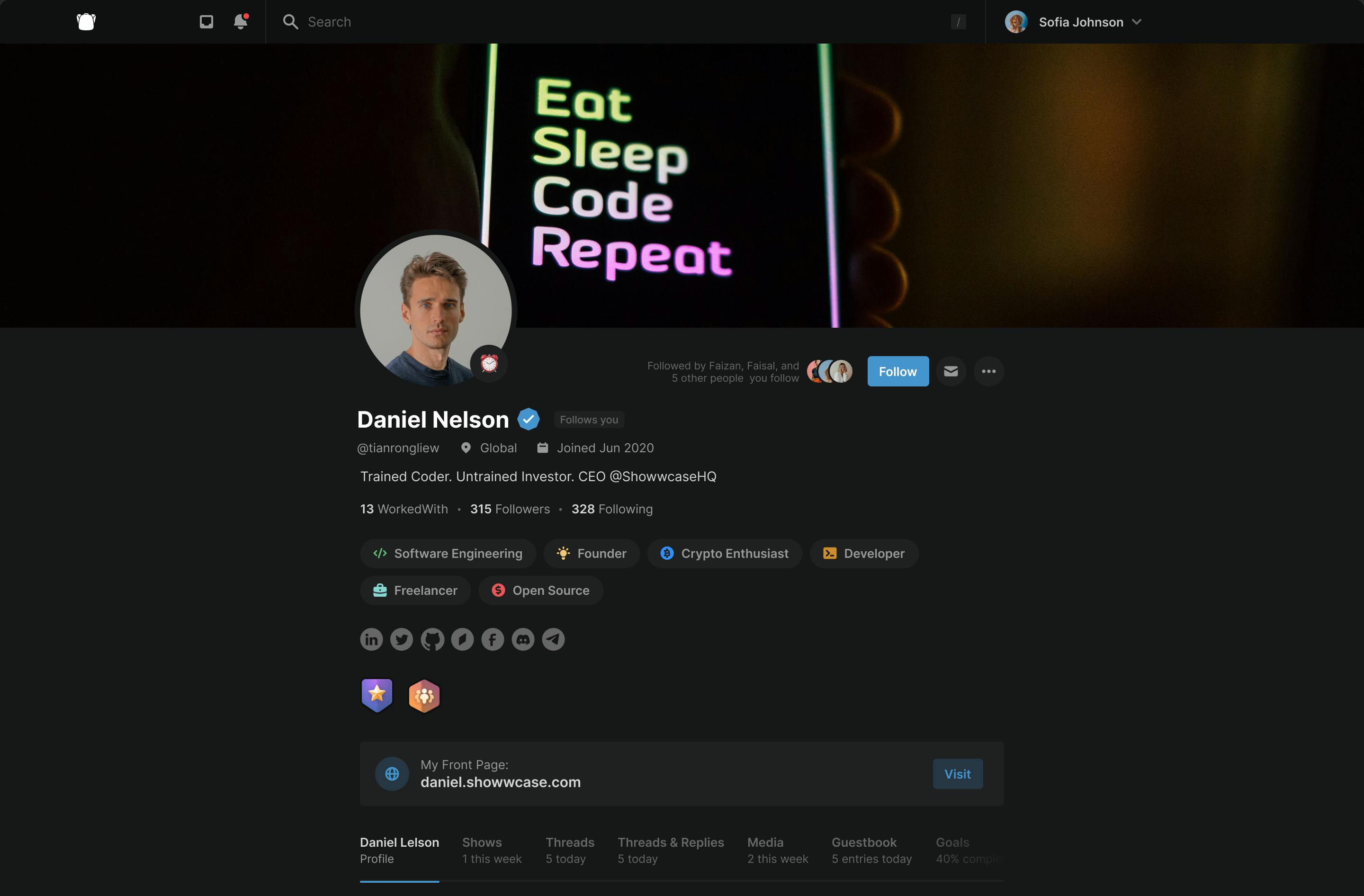
Our goal here is to showcase who we are as coders/developers/hackers/engineers. This means your entire range of skills, interests, blogs, projects, and repositories in a world that prioritises peoples’ publicly demonstrated abilities over their one page A4 resumes. We give this to everyone for free, out of the box, and ready within seconds.
One unique feature here is your Circle network. Instead of thousands of "connections", you really want your true network to be around people you've worked with, collaborated with or can vouch for who you are. Why? Because they can say a lot about who you are, what you've done, and act as a thumbprint of reference when you are planning on what to do next. This is especially true in the tech world where we are always collaborating with others on new projects, open source, startups, research, podcasts, articles, you name it. It's never been easier for a group of talented people to come together and build something new - it's one DM away. Of course, going at it alone is fine too. Like the Avengers, they can each do well in their own solo movies, but when they come together "This is where the fun begins" (iykyk). At the end of the day, it's more fun when we do things together.
Now with your Circle, you can find send in your references together in your application to a new work placement. Making the hunting process less of a Single Player Game and into a Multiplayer Game.
As an icing across the top, Showwcase helps you generate a lovely Resume 2.0 to which you can download as a PDF and send it anywhere in the world.
Check out my good friend Tapas' Resume 2.0 below
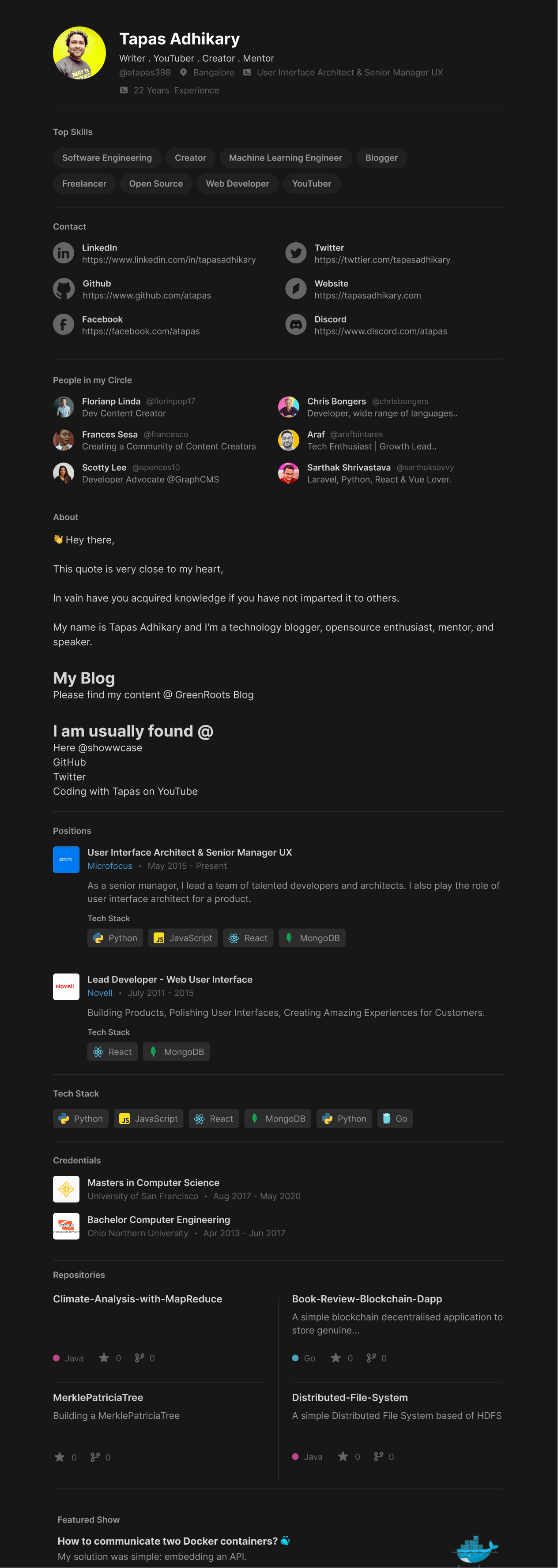
Community
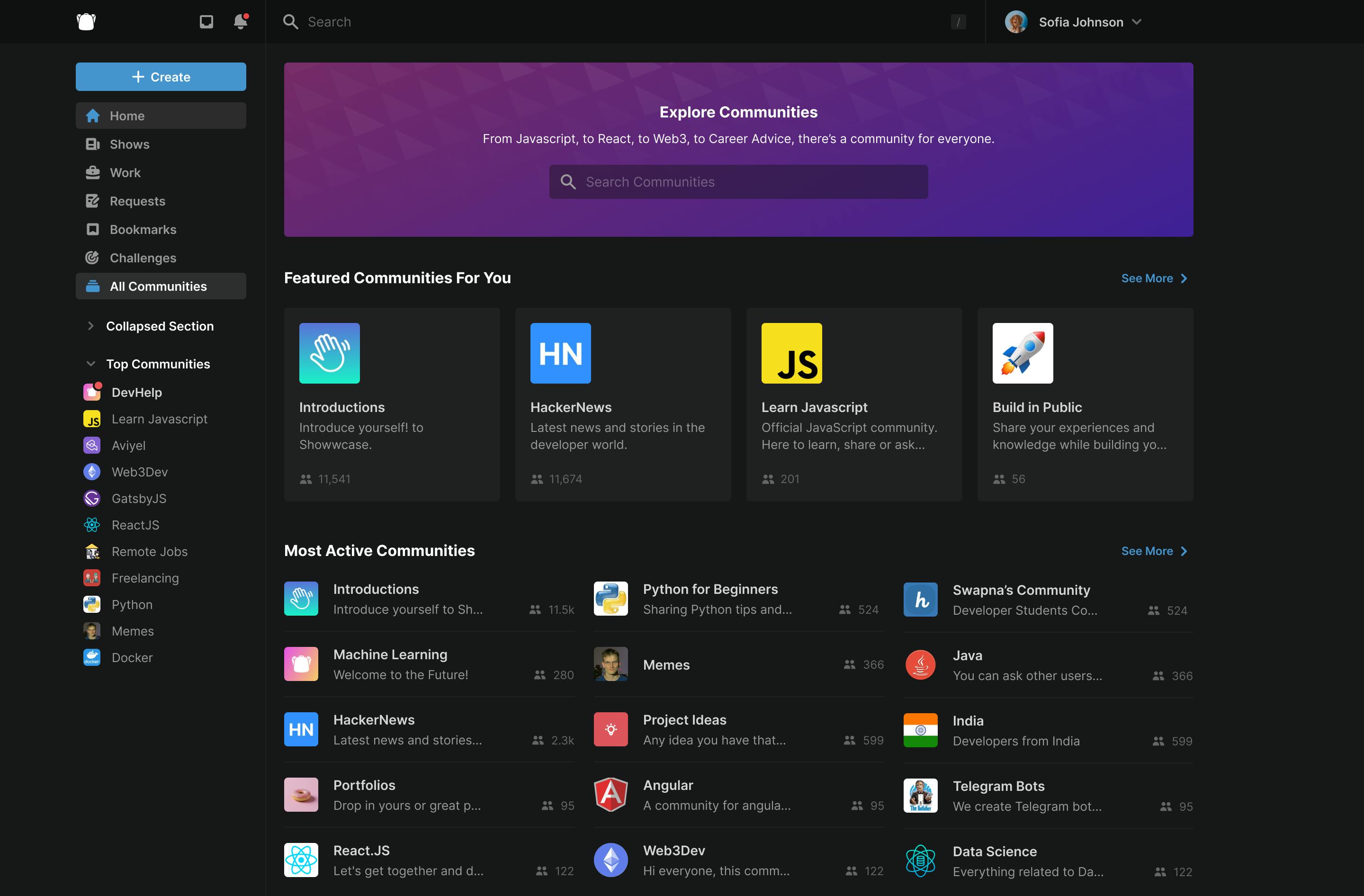
One of the best parts of learning how to code is the community aspect. We are all going through a similar experience of endless learning together. What to learn? How to learn? Imposter Syndrome? Learning is huge struggle and can be a very lonely journey. But we want to learn because thats how we all grow, and with a community by our side, it becomes a much more pleasant experience. We can encourage each other, help each other find that semi-colon, and when that code finally runs, celebrate together! The overall experience just gets infinitely better when part of a community.
When you share your knowledge with the community on Showwcase, we want it to be focused on Signal, not noise. Every tool we’ve built into sharing takes this into account. Whether it be insightful articles you write in a Show, questions and discussions you start in a Thread, or a helpful link to an external resource - YouTube, personal blog, news update.
Lastly, Showwcase is a large community made up of many smaller communities. You can follow others, to stay updated on what they are sharing, or you can just join dedicated communities to share knowledge and discuss ideas by topic. It's all up to you.
Opportunity
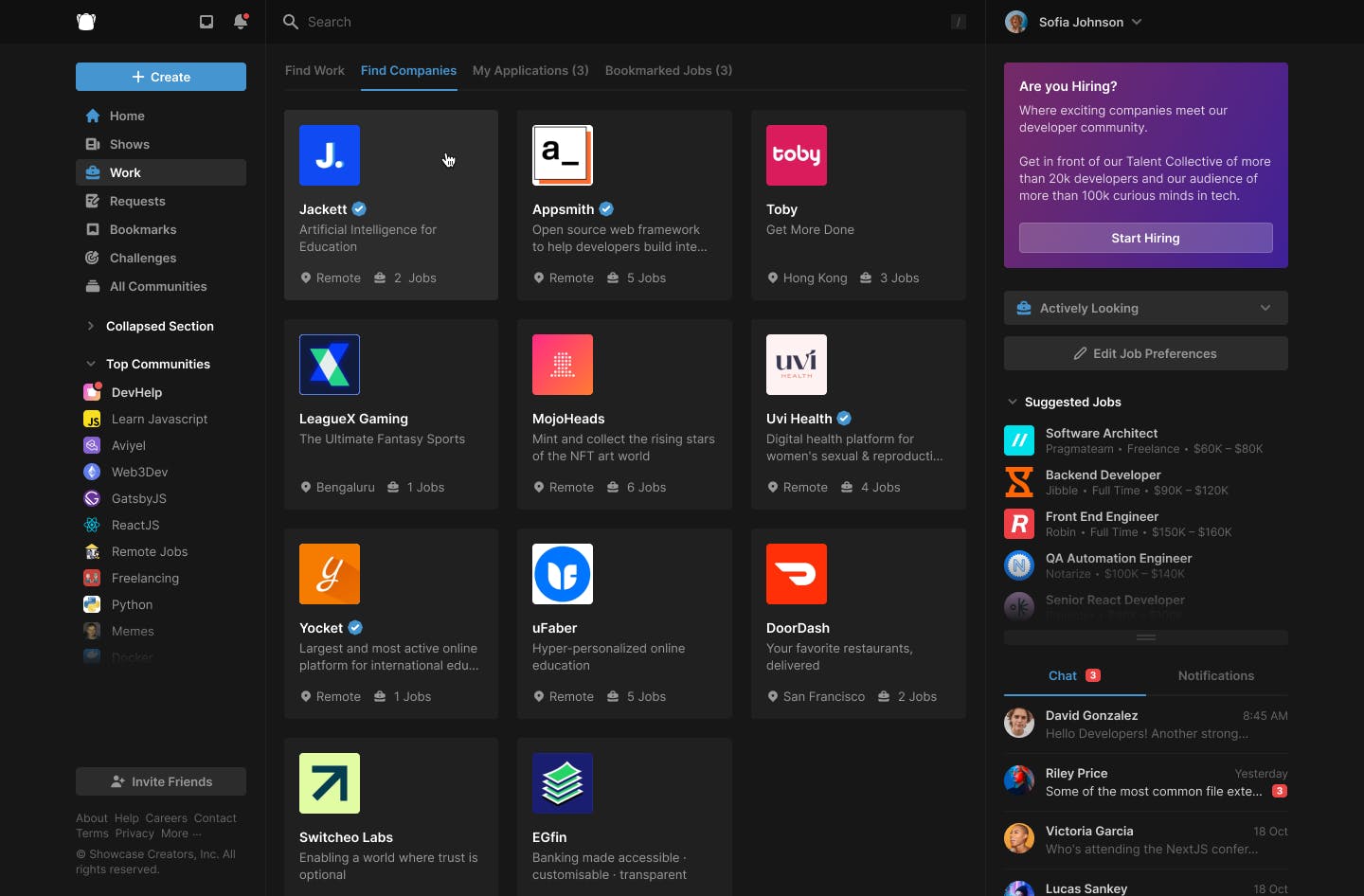
One of the largest problems I have with existing networks is that developers are lumped together with other professional categories - the suits, doctors, lawyers, sales people, investors and more. This isn't necessarily bad, and a general platform for everyone has its benefits, but it means we cannot optimise. And we love to optimise. When I say optimise I mean things like share code, write in Markdown, built-in shortcuts, showcase your tech stack, but more importantly, it’s about how we cater to the future of work era we are about to enter for people in tech. Let me explain.
Future of Work
The Future of Work era for tech workers is defined by teams working from anywhere, flexible workforces, on-demand augmentation teams, gig work, independent creators, people businesses, and solopreneurs. To us, this means that the idea of a "job board" needs to evolve, how we "connect" needs to evolve, and how we engage with opportunities need to evolve.
In the words of Peter Thiel:
The future is a place that looks different than today. If for the next 50 years, nothing changes in society, then there hasn't been any innovation and the future is after 50 years from today.
We're already experiencing a world of work that looks different from yesterday. Everyone works from anywhere, asynchronous work is here to stay, and being a creator is a real career. We're a team of 9 at Showwcase today, and i've never met more than anyone in my team face-to-face. We all trust each other to get work done asynchronously, we have no office, everything flows through Kanban boards, Discord Channels, Zoom calls, and hiring is basically done on Twitter and Showwcase. In fact, the best companies are already doing it: Basecamp, Gitlab, Coinbase.
"30% of the days in the office will go away." - Bill Gates
Things may go back to normal, maybe, but a hybrid model is more likely. Things will definitely change and I believe that returning to the way things were is like choosing not to adopt software for your business a few years back. It’s up to each company to decide, but that decision will make or break your company. The teams and individuals that embrace the future of work stand to benefit from it most. Example: You live in Bali, Indonesia, found gig work for a US based company on Showwcase, collaborate on Github, track work on Notion, go to the virtual office on Gather and communicate via Slack. Why not?
Our mission at Showwcase is to maximise the career opportunities of coders, and to do that, we need to build a space that facilitates these future of work opportunities. We need to solve this for both developers and the teams that hire them. You can hire on Twitter for some roles, but not all of them. In fact, some of the best engineers, system architects, and data scientists I know have 0 followers and never make a single post. As a developer looking for a job and now a Founder focused on hiring a great team I’ve experienced this from both ends. I believe we can do better. The specific ideas and features to get there will reveal itself over time, but that is our north star.
For more on this, check out my article "10 Opportunities for the next 10 years" (for coders)
Showwcase
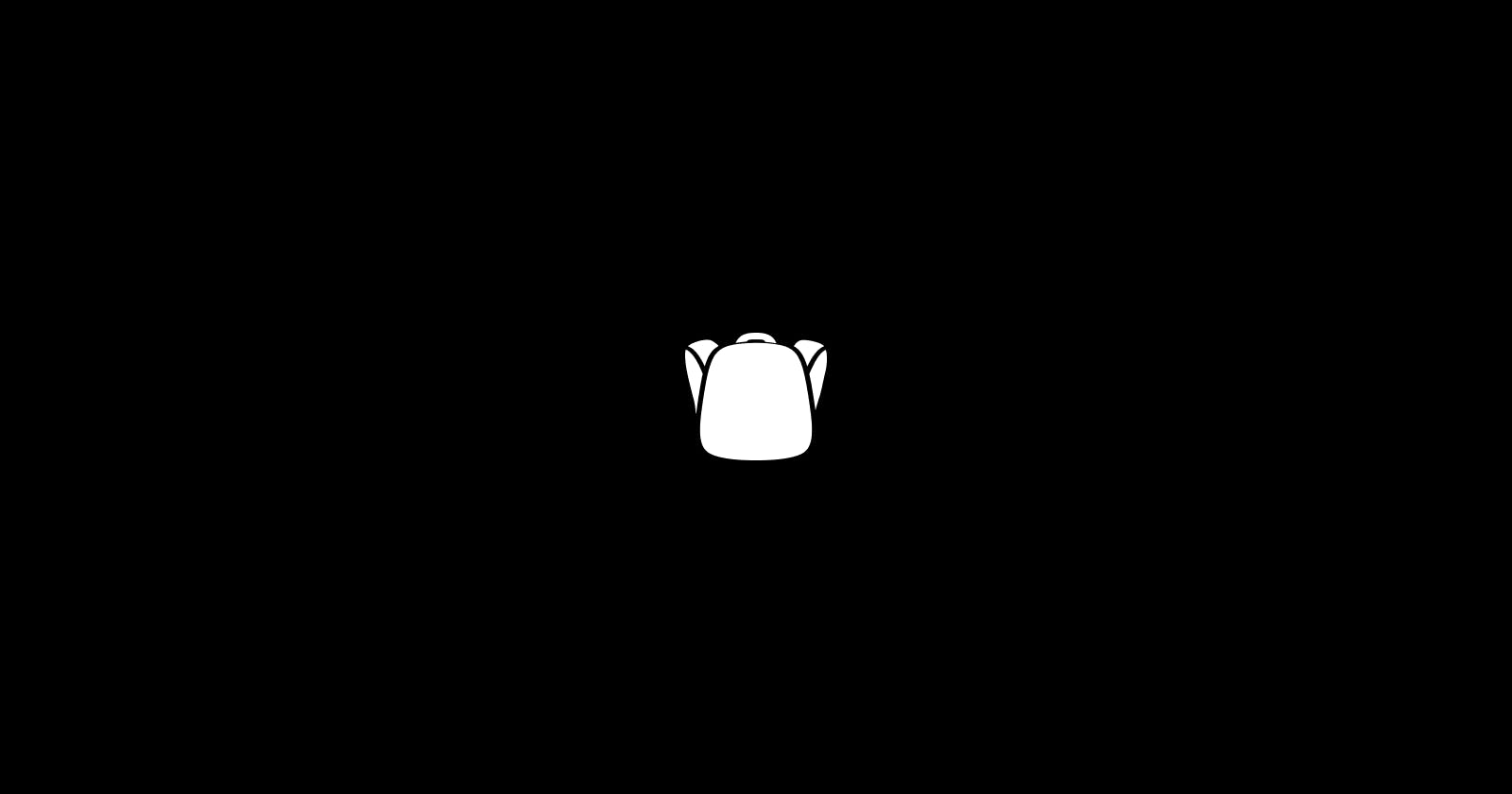
It's been frustrating using networks where 'connections' are meaningless, content is focused on self-gratification, and messages have become spam. It deteriorates the user experience, and not good for the value of your network.
At Showwcase, our goal is to change this and we want to build it for us in the tech community who devote ourselves to pushing technology forward. We believe that over the next decade, people who can code will be the most important asset to every business, idea, and company.
It is almost inevitable that coders will be central to every company as software becomes core to every industry. We are already seeing this shift in huge swaths. Developers are moving up an organisations stack: Product, Design, Customer support, Infrastructure, reliability, recruitment, executive positions. The need to connect with, access, and collaborate with these individuals will grow indefinitely for organizations over the next 10-20 years. Whether it be organizations going through business transformation, building apps for consumer interactions, or automating mundane human tasks. We are at the beginning of a transition. Many people born today will know how to code to some degree, and be part of the tech workforce.
So instead of a disparate collection of apps and experiences, we aim to build a fresh, beautifully designed platform, which when used by anyone that codes and understands developer workflows, feels it was purpose-built for us. Something that will empower you to express yourself, build community, exchange ideas, and have fun together.
You decide how you want to participate in the network. You decide who is in your network. You decide what content you want to see. You decide what kind of messages get delivered to you.
Showwcase is what we're building to bring this to the tech community. We have a long way to go but we'd appreciate your support by signing up and sending us feedback whenever you can.
You can follow me on Showwcase, Twitter, or Hashnode if you’d like to connect.
Till the next one,
Rong
[1] a16z.com [2] a16z.com/2011/08/20/why-software-is-eating-.. [3] blogs.microsoft.com/blog/2020/06/30/microso..
